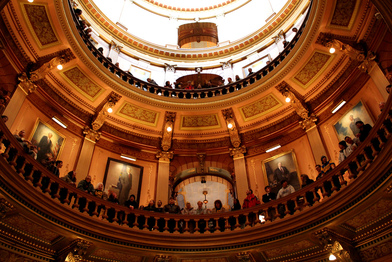
How much more depends on what you buy during the course of a year.
The Tax Foundation has come out with a report that details the percentages of various taxes that make up each state’s tax
| | revenue (read the report here). You can look up your own state. In Utah, 26.7 percent comes from property taxes, while 37.5 percent comes from sales tax and 25.3 percent from personal income taxes. Also, governments in the United States today rely on property taxes far less than they did a long time ago. In 1902, for instance, 82.1 percent of all government revenue came from property taxes. Of course, income taxes were still illegal then, and sales taxes didn’t really come into fashion until the Great Depression. Also, overall tax burdens were much less back then. There are a couple of ways to look at these figures. One is from government’s point of view. Only policy wonks and politicians want to do this, but it’s an important view to consider. Governments are wise to have a tax structure that comes close to pulling equally from all three tax types. It’s like a stool with three legs. You lose stability if the legs aren’t equal. If a state relies too much on sales taxes, for instance, a recession can be devastating. People just don’t buy as much when the economy goes bad. Likewise, relying too much of property taxes can put you in trouble if the housing market goes bust. This is why the most recent recession was so devastating. Housing went kaput and sales tax revenue dried up. And when people lost their jobs, income taxes fell, too. Poor, poor governments (everyone shed a tear, please). A much more popular way to look at this is from the taxpayer’s point of view. People complain the loudest about property taxes. When governments try to raise them, angry mobs descend. This is for a couple of reasons. People feel, rightly so, that their property (defined most often as their house) is sacrosanct. They resent governments implying they can take that property away by force (although this seldom happens until taxes are several years in arrears). But the biggest reason is that property taxes are so visible. You get a bill at the end of each year telling you how much you owe. There is something stark and raw about that. There also is something transparent and accountable about it. Income taxes produce similar feelings, but under the current system Americans seem too engrossed in the game of finding deductions and reducing their taxable income to get too upset. They rejoice over a large tax refund check, seldom stopping to think that the government has held that money — their money — interest free for most of a year. If people didn’t have to pay sales taxes a little at a time, if cash registers just kept a notation of what you owed and forwarded it to a giant database, and if you got a bill at the end of the year for the total you owed, I’m guessing we’d be assembling mobs that compete with the property tax mobs. As it is, we tend to forget about sales tax. That’s good for government, but not necessarily for you. |

 RSS Feed
RSS Feed

